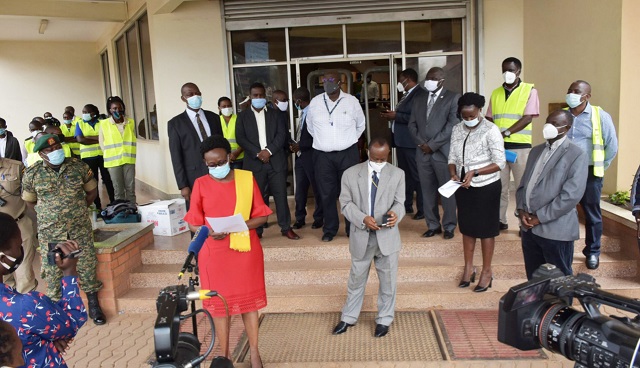
Here’s why that is dangerous at this time
Kampala, Uganda | RONALD MUSOKE | Up to 78% of Ugandans don’t fear COVID-19, a survey recently done and published by Whitehead Communications, a Kampala-based firm shows. That is a stark contrast to March, when the first COVID-19 case was registered in Uganda.
When the researchers asked whether people approved of the government’s decision to lock down the country in March 2020 in response to Covid-19, up to 75% said “yes.” Only 9% said they were not sure, 11% said no and 6% said “no” strongly.
But when asked how much Ugandans fear Covid-19 at the moment compared to the beginning of the pandemic in March, the survey found that the majority of respondents in Uganda (78%) feared Covid-19 less in July than they did in March. Only 13% said they fear Covid-19 more in July than they did in March, according to their recollection.
Asked how serious they are following Covid-19 rules like physical distancing, mask-wearing and hand washing, the survey found that Ugandans are not on the same page when it comes to applying the public health directives.
The report noted that there is no majority opinion, but 35% reported being “very serious” and 27% reported being “somewhat serious.” According to the researchers, this “may suggest that a majority (62%) are taking directives seriously.”
Moses Mulumba, the executive director of the Centre for Health, Human Rights and Development, a Kampala-based non-profit told The Independent on July 24 that he is not surprised at how the Ugandans’ attitudes have quickly changed towards COVID-19.
“Initially we approached COVID-19 as something to fear; people were locked up in their houses and only a few technical people were allowed to participate in the management of the pandemic,” he said, “That is why you hear people say that is a government thing.”
According to Mulumba, the government’s failure to mobilise well ordinary citizens in preference for a militaristic approach has contributed to the resentment of COVID-19-related information.
Anger over economy
The Whitehead Communications survey was conducted between July 6-15 among 1,182 respondents including university-educated men residing in the Kampala Metropolitan Area (Kampala, Wakiso and Mukono districts) as well as upcountry-based but less-educated women. It was done to share insights into what Ugandans think about the government’s response towards COVID-19 and its impact on their lives.
Ugandans said their employment and financial status had deteriorated with 60% saying their savings had dried up while 26% of the respondents said they had failed to service their loans. Another 22% of Ugandans, according to the survey, have taken on more debt while 12% of Ugandans have had to sell their assets to manage the financial crunch.
Most Ugandans, according to the survey are already struggling and do not have a very optimistic outlook for how long it may take for life to return to what it once was before the crisis began. Only 3% feel that life is already back to normal, while 7% believe it will take less than three months while 24% believe a recovery would take between 3—6 months and 36% believe that recovery will take more than a year. Five percent believe that life will never return to normal, and 25% are not sure about the future.
Mulumba told The Independent that the COVID-19 pandemic has crushed people’s livelihoods and although President Museveni talks about preventing COVID-19 deaths, many people are looking at the pandemic as something which took away their lives.
 The Independent Uganda: You get the Truth we Pay the Price
The Independent Uganda: You get the Truth we Pay the Price




I would contribute this profound ignorance to the fact that most Ugandans don’t have the slightest idea how destructive and deadly this virus is. Most Ugandans don’t get to know the plight of other countries and how the virus is robbing these societies of their folk. The lack of information and a deficit in understanding the pandemic make for such figures. If only we would be able to decimate information to all people especially information from outside Uganda, maybe these figures would change. Peasants in the rural areas don’t have access to international news! They don’t have access even to domestic news. Hence they can’t compare the effect of the pandemic in Uganda with other countries! People need to “see” those graves and coffins in Brazil and Columbia to understand this virus!Not to merely depend on numbers from Uganda. Awareness is lacking on the side of the Ministry of Health.
But then,why is that the figures on covid 19 stats keeping changing abnormally eg there is when the number of recoveries were more than the cases we had and previously we had registered more than 1010 recoveries but so far I am seeing that we have less than 1000 recoveries.let us be notified of the real thing and that’s when we shall become more serious.
more info here
https://votepodium.com/2020/07/27/vote-for-kisoro-woman-mp/